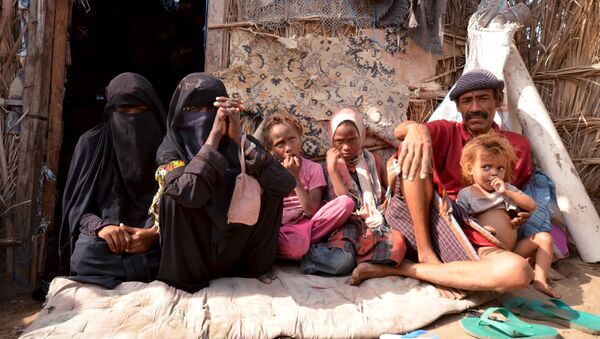With the 11-month long Saudi aerial bombardment of Houthi rebel targets continuing, critics have accused western nations — principally the UK and US — of exacerbating the conflict and worsening the humanitarian situation through their continued sale of arms to the Gulf Kingdom.
"UK arms have been central to the bombing of Yemen — US arms as well," Andrew Smith, spokesperson for the UK-based Campaign Against Arms Trade (CAAT), told Sputnik.
"The UK has provided fighter jets and bombs used in the campaign and it has created a humanitarian catastrophe. But this has also provided a political cover as well, as the bombs are coming down with the western endorsement. I think that helps the Saudis and gives them a fig leaf of legitimacy to the bombing campaign."
— CommonSpace (@TheCommonSpace) February 4, 2016
Arms dealers feast while Yemen starves: https://t.co/hZ8pK642Ho
— CAAT (@CAATuk) February 4, 2016
21 Million Need Aid in 'Humanitarian Catastrophe'
The criticism follows concerns raised by the UN's humanitarian chief, who said that more than 21 million Yemenis were in need of some sort of aid, with the situation resembling a "humanitarian catastrophe."
— Stephen O'Brien (@UNReliefChief) February 16, 2016
.@UNReliefChief O'Brien spotlights need to end human catastrophe in Yemen https://t.co/EOANCvBwjQ pic.twitter.com/Dzr2HB0y1V
— United Nations (@UN) February 16, 2016
In a briefing to the UN Security Council, following a request from Russia, Stephen O'Brien said ongoing fighting from both sides was inhibiting efforts to help civilians in need of essential supplies and care.
"UN agencies and NGO partners are delivering assistance under extraordinarily difficult and dangerous circumstances," O'Brien said.
"Just this last Sunday, a Saudi-led coalition air strike hit a building 200 meters away from the Diplomatic Transit Facility, accommodating UN and diplomatic personnel."
O'Brien said that more than 6,000 people had been killed in Yemen since Riyadh announced plans to lead a Gulf coalition against Houthi rebels in march 2015, with half of these deaths thought to be of civilians.
“Please do something to stop this war” Baraa, 13, who lives with her father in Taiz, #Yemen. @UNICEF_Yemen pic.twitter.com/iMkWCf5QYx
— UNICEF (@UNICEF) February 16, 2016
At least 7.6 million Yemenis were "severely food insecure," while about 3.5 children prevented from going to school.
Concerns 'Fall on Deaf Ears'
While the Saudi-led bombing in Yemen and blockade of Yemeni ports has been widely accused of worsening the civilian situation in Yemen, many critics have hit out at the continued sale of British and American arms to Riyadh.
في الفترة مابين 13 و 26 من يناير، قدمت اليونيسف الخدمات الصحية و الغذائية لأكثر من 40,000 مستفيد من خلال 79 فريق متنقل، متضمناً أطفال تحت سن الخمسة أعوام و النساء الحوامل و المرضعات.#أطفال_اليمن#اليمن
Posted by يونيسف – اليمن UNICEF Yemen on Tuesday, February 16, 2016
Despite numerous reports of war crimes and breaches of international law allegedly being committed by the Saudi strikes, Andrew Smith told Sputnik that those concerns had "fallen on deaf ears in the West."
While acknowledging that UN and other organizations must be able to actually get into Yemen to address the humanitarian concerns, Smith told Sputnik that immediately halting the sale of arms to Saudi Arabia is essential in helping the situation.
"The bombs have to stop and the best thing the UK can do would be to end all arms sales to Saudi Arabia. Since David Cameron took to office [in 2010] the UK has licensed £6.7 billion (US$9.6bn) worth of arms to Saudi Arabia and has given it huge support on the world stage."
The British government has defended its sale of arms to Saudi Arabia, arguing that it has one of the most stringent arms sales policies in the world.
Following the criticism UK ministers have spoken of Saudi Arabia's progress in regards to human rights, however Smith says the rhetoric doesn't match reality.
"It [Saudi Arabia] is one of the most brutal, barbaric regimes in the world. We saw that at the beginning of the year when it executed 50 of its own citizens and also through its conduct in Yemen."


